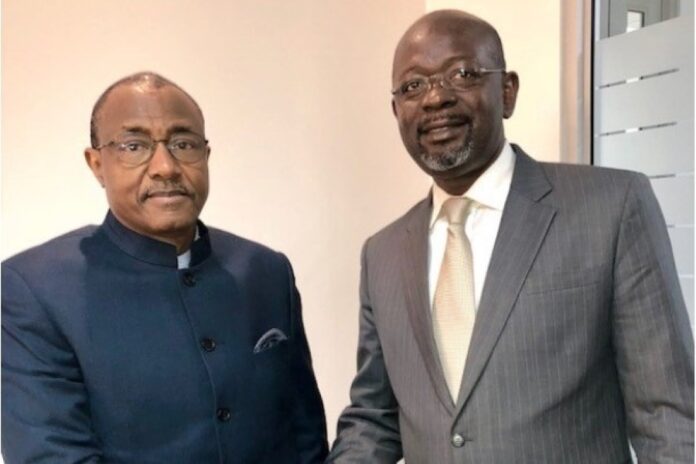A study by Ezekiel, U. A. (2023) titled “SUB-SAHARAN AFRICAN BRIEF HISTORY OF MATHEMATICS DEVELOPMENT AND SUB-SAHARAN ENERGY DIVERSIFICATION AND SUSTAINABILITY USING MATHEMATICAL TOOLS FOR ANALYSIS, published in BW Academic Journal reveals that there is a negative correlation between GDP growth rate and energy diversification in sub-Saharan Africa.
“
There is a negative correlation between GDP growth and energy diversification in Sub-Saharan Africa, emphasizing the need for strategic reforms.– Ezekiel, U. A. 2023
The study examines the historical evolution of mathematics in selected Sub-Saharan African countries, emphasizing its role in technological and scientific progress. The study critiques the reliance on rote learning in elementary education and advocates for a shift toward critical thinking and independent problem-solving skills in mathematics instruction.
Additionally, the research investigates energy diversification efforts in the region using the Energy Mix Concentration Index (EMCI). It assesses the relationship between GDP growth and energy diversification, revealing that economic expansion does not necessarily lead to a more diverse energy mix. The findings underscore the importance of a well-balanced energy portfolio for sustainable economic growth and energy security. Ultimately, the study provides key recommendations for enhancing mathematics education and advancing energy diversification strategies to support long-term development in Sub-Saharan Africa.
How the Study was Conducted
The author employed a combination of historical and mathematical methodologies; the study provides a comprehensive analysis of these interconnected themes. The research examines the evolution of mathematics in selected Sub-Saharan African countries, highlighting both its contributions to technological advancements and the challenges posed by traditional rote learning methods. It evaluates the effectiveness of mathematics education by analyzing teacher-student ratios in primary and secondary schools, emphasizing the need for improved instructional approaches that foster critical thinking and independent problem-solving.
To assess energy diversification, the study utilizes the Energy Mix Concentration Index (EMCI) to measure the diversity of energy sources across various African nations. It further employs mathematical tools for economic analysis, including GDP growth rate evaluations, and applies the Pearson correlation test to investigate the relationship between economic growth and energy diversification. Findings indicate that a higher GDP does not necessarily correspond with a more diverse energy mix, reinforcing the need for strategic diversification to ensure sustainable economic growth and energy security. Ultimately, the study underscores the crucial role of mathematics in fostering innovation and economic development while advocating for policies that enhance both mathematics education and energy sustainability in Sub-Saharan Africa.
What the Authors Found
The study discovered that there is a negative correlation between GDP growth rate and energy diversification in sub-Saharan Africa. The paper emphasizes the usefulness of mathematical tools in the critical economic analysis of GDP and energy diversification. The analysis used the Energy Mix Concentration Index (EMCI) to examine the growth rates of selected countries. In addition, the study highlights the importance of mathematics in technological and scientific development and condemns the rote learning system prevalent in elementary schools.
Why is this important?
Preserving Cultural Heritage: By exploring the history of mathematics in sub-Saharan Africa, the study highlights the region’s rich contributions to the field, which have often been overlooked in mainstream historical accounts.
Improving Education: The critique of rote learning and the emphasis on critical thinking and independent reflection provide valuable insights for improving mathematics education in the region. Stronger mathematics education is crucial for developing future scientists, technologists, and innovators.
Energy Diversification: Understanding the correlation between GDP growth and energy diversification helps policymakers and stakeholders recognize the importance of a diversified energy mix for sustainable economic growth and energy security.
Policy Recommendations: The study provides actionable recommendations for improving mathematics education and supporting energy diversification efforts. These recommendations can guide governments, educational institutions, and international organizations in their efforts to foster development in sub-Saharan Africa.
Technological Advancements: A well-educated population in mathematics and science is essential for technological innovations. By emphasizing the need for better mathematics education, the study supports the goal of making sub-Saharan Africa a producer of technology rather than just a consumer.
Sustainable Development: Energy diversification is critical for ensuring a stable and sustainable energy supply, which is essential for economic development and poverty reduction. The study’s findings underscore the need for strategic planning and investment in diverse energy sources.
What the Authors Recommended
- The study suggests stronger teaching of primary and secondary students in mathematics.
- The authors call for more direct government support for teachers, faculty, and infrastructure.
- The study recommends strengthening and expanding training and research activities, especially regional networks of people and institutions.
- Furthermore, it advocates for scholarships for graduate students and fellowships for faculty.
- In addition, the study underscores the need for a clearer path to rewarding mathematics-based careers and support for energy diversification efforts.
In conclusion, the study by Ezekiel, U. A. (2023) provides valuable insights into the interconnected roles of mathematics education and energy diversification in Sub-Saharan Africa. By highlighting the negative correlation between GDP growth and energy diversification, the research underscores the need for strategic policies that promote a balanced energy mix to ensure long-term economic sustainability. Additionally, the study advocates for a shift away from rote learning toward critical thinking and problem-solving in mathematics education, which is essential for fostering technological and scientific advancements. Implementing the recommended reforms in education and energy policy will be crucial for driving innovation, economic resilience, and sustainable development across the region.
















 The African Research (AR) Index is a comprehensive scholarly directory and database focused explicitly on journal publishers that publish and disseminate African research.
The African Research (AR) Index is a comprehensive scholarly directory and database focused explicitly on journal publishers that publish and disseminate African research.

